How Much Do You Need for a Wedding in Ghana? Budget Tips and Ideas
Planning a wedding in Ghana can be both exciting and challenging. With so many options and choices, the costs can add up quickly. If you’re wondering how much you might need, you can expect to spend between GHC 5,000 and GHC 15,000 for a typical wedding. This range covers everything from traditional ceremonies to elegant receptions, offering flexibility based on your preferences and priorities.
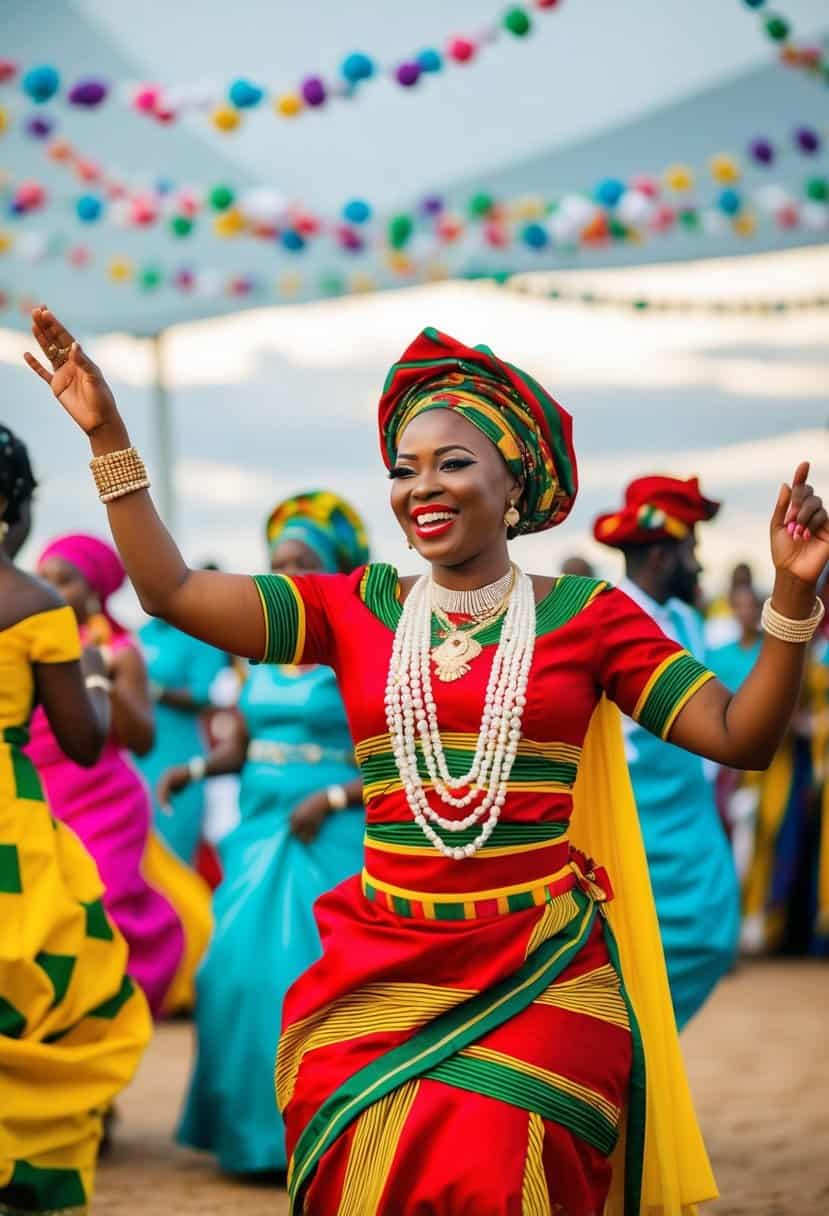
You might want to consider factors such as venue, guest list, and specific traditions that matter to you. Traditional Ghanaian weddings often include unique elements and rituals, which can influence the overall budget. For instance, traditional weddings in Accra suggest spending between GHC 15,000 and GHC 20,000 for decor alone. These elements can transform your wedding into a special and memorable day.
Whether you’re dreaming of a small intimate ceremony or a grand celebration, knowing the budget helps you make informed decisions. It ensures that you celebrate your love story your way, while also sticking to what you can afford.
Understanding the Types of Weddings in Ghana
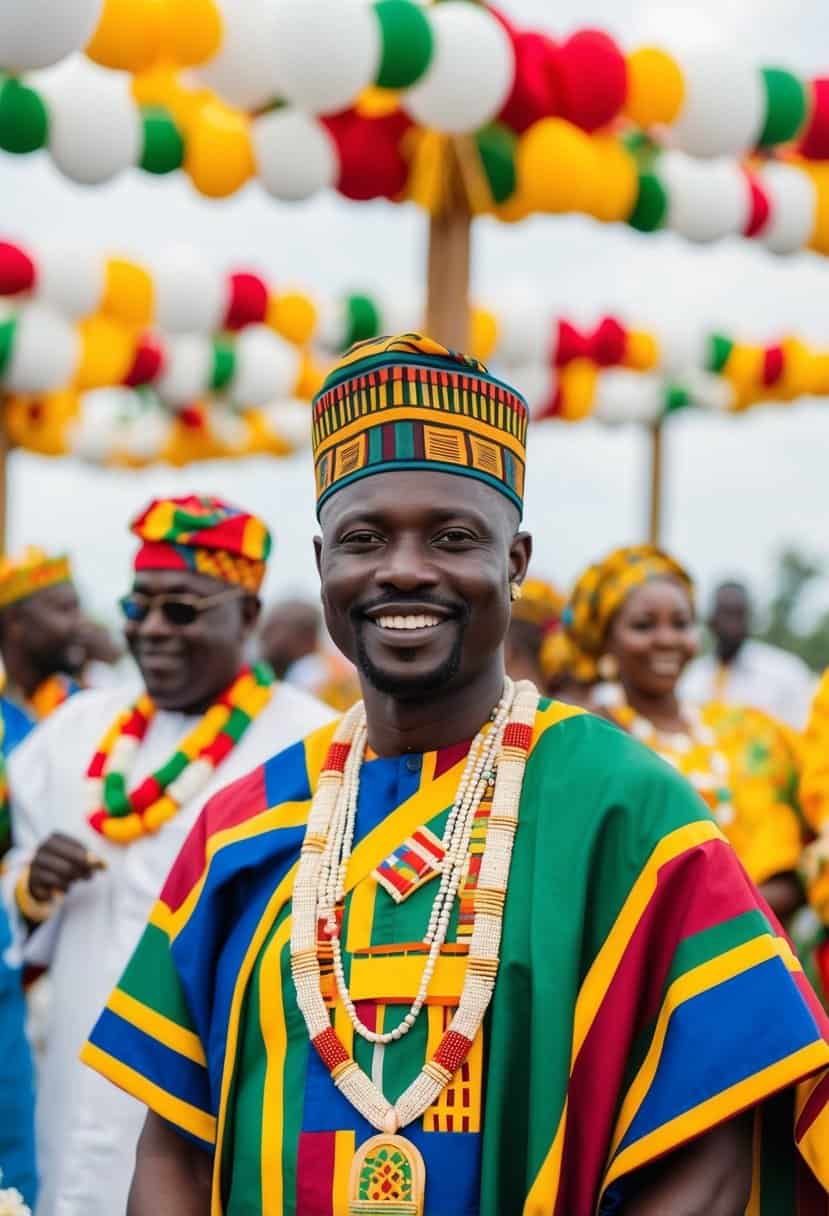
In Ghana, weddings blend customs and traditions with modern influences. You can experience different ceremonies, from the spiritual “white wedding” to the deeply cultural traditional Ghanaian wedding. Each type of wedding carries its own customs and requirements.
White Wedding vs Traditional Ghanaian Wedding
A white wedding often follows Western traditions. It typically involves a church ceremony where vows are exchanged in front of guests. Brides wear white gowns, and grooms don suits. This ceremony is spiritual and is conducted by a pastor or priest.
In contrast, a traditional Ghanaian wedding is full of vibrant cultural elements. It often starts with a knocking ceremony, where the groom’s family asks for the bride’s hand in marriage. This celebration includes traditional music, dance, and attire.
Couples sometimes choose to hold both ceremonies on different days. This allows them to honor both modern and traditional customs.
Customary Marriage and Dowry
A customary marriage involves rituals deeply rooted in Ghanaian culture. This type of wedding requires the payment of a dowry or bride price, which is a symbolic gesture. The items in a dowry are agreed upon by the families and can include money, clothes, and jewelry.
During the customary marriage, both families play significant roles in negotiations and blessings. The union is considered valid once these steps are completed, even before any official registration.
It’s important to understand and respect these traditions as they hold cultural significance to many families in Ghana.
Destination Wedding Possibilities
Many couples consider a destination wedding in Ghana. The country offers beautiful venues from coastal beaches to lush gardens. With a unique blend of traditional customs and scenic views, it provides a memorable backdrop for your big day.
Planning a destination wedding in Ghana involves additional logistics, such as travel arrangements and guest accommodations. However, hosting a wedding here offers a unique experience with rich cultural elements.
You can choose to incorporate aspects of a traditional Ghanaian wedding into your destination event, creating a personalized and unforgettable celebration.
Initial Steps in Wedding Planning

Starting the journey of planning a Ghanaian wedding involves several crucial steps. Setting a budget establishes your financial framework, while drafting a guest list is key in deciding the venue size and arrangement. Selecting a wedding planner can alleviate stress and provide professional guidance.
Setting Your Wedding Budget
Determining your wedding budget is the foundation of successful wedding planning. This involves evaluating how much you can afford and being realistic about expenses. A Ghanaian traditional wedding might cost around GHS 5,000 to GHS 20,000, depending on various factors.
Your budget should cover all essentials like venue, attire, food, and entertainment. Invest time in researching typical costs to avoid surprises. It helps to use spreadsheets or budget apps to track and adjust financial plans. Always set aside some funds for unexpected expenses.
Drafting the Guest List
Creating a guest list is crucial for determining the scale of your wedding. First, decide whether you want a large celebration or a more intimate gathering. A typical Ghanaian wedding often includes extended family and community members, so it’s important to consider cultural expectations as well.
Write down essential family and friends, then expand if the budget allows. Discuss with your partner and families to ensure everyone feels included. Be ready to cut down if costs rise, prioritizing those closest to you. Remember, the guest list impacts venue choice and catering needs, so keep it flexible.
Selecting a Wedding Planner
Choosing the right wedding planner can greatly ease the process of planning your wedding. A planner familiar with Ghanaian customs will help you incorporate cultural elements smoothly. They handle logistics, liaise with vendors, and ensure everything runs on time.
To find a reliable planner, ask for recommendations or search reviews online. Interview potential planners to ensure their style matches your vision. Confirm their experience with your type of wedding—traditional or modern—and discuss your budget constraints. A good planner can be a stress reliever, allowing you to enjoy your day.
Designing Your Dream Ceremony
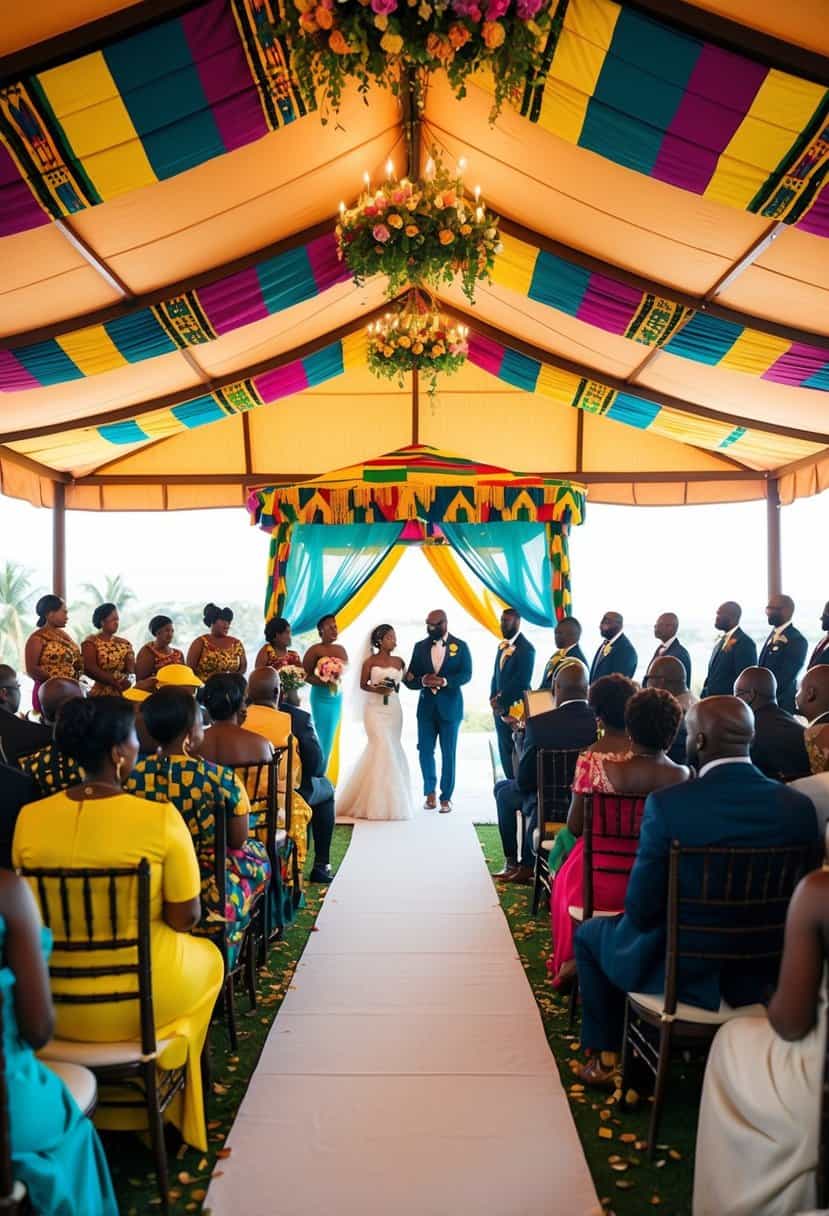
Bringing your dream wedding ceremony to life involves several exciting decisions. You can blend traditional elements with personal touches, ensuring your celebration feels unique and memorable. Focus on attire, decorations, and ceremony details to create a perfect day.
Choosing Wedding Attire
Wedding attire plays a crucial role in your ceremony. For a traditional touch, consider wearing kente cloth, known for its vibrant colors and patterns. It adds a beautiful connection to Ghanaian wedding traditions. You may also choose other elegant gowns and suits that match your wedding theme.
When selecting attire, think about the ceremony’s setting and time. A beach wedding may call for lighter fabrics, while a church ceremony might suit more formal attire. Don’t forget to coordinate accessories for a complete look, and ensure the entire bridal party aligns with the theme.
Curating Decorations and Theme
Creating the right atmosphere starts with your wedding decor. Choose a color palette that reflects your personal style and complements the venue. Candles and flowers can enhance the ambiance, whether you’re in a church, garden, or beach setting.
A wedding theme can tie everything together. It could be something cultural, like focusing on a traditional Ghanaian motif, or something modern and chic. Decorations should also include table settings, aisle decorations, and any special stage for the couple.
Personal touches, like custom signage or photos, can make the venue feel more intimate and personal. Having a consistent theme helps guests feel the love and attention to detail you’ve put into your big day.
Planning the Ceremony Details
Deciding on the flow and features of your wedding ceremony is vital. You may blend a customary marriage with a modern exchange of vows. Consider including traditional dances like the Adowa to add cultural richness.
Timing is important. Clearly plan when each part starts, like when guests arrive, the procession, vows, and end of the ceremony. Assign roles, such as who will hold rings or give readings.
Finalize the schedule, ensuring there’s ample time for each part. Take care to incorporate any desired special rituals, ensuring your ceremony reflects your shared values and beliefs.
Reception and Catering Essentials
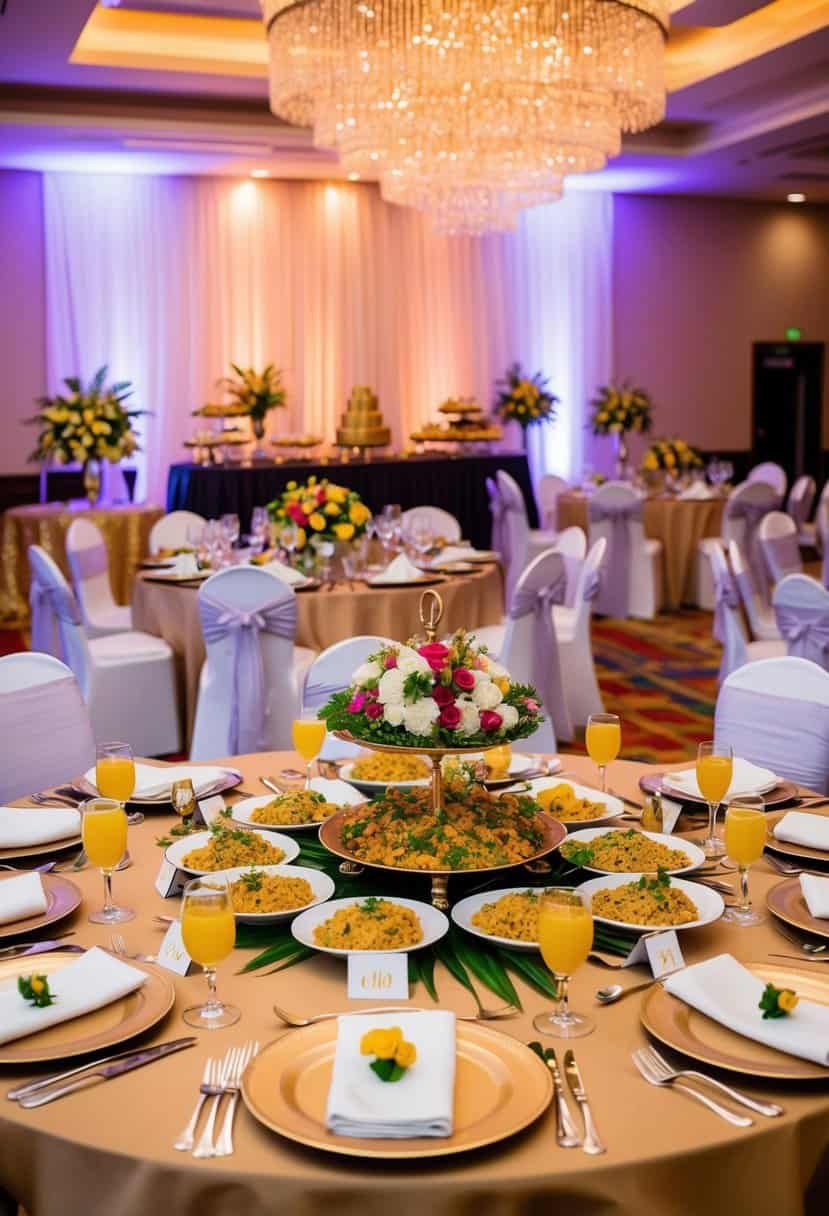
Planning a wedding reception involves important decisions about the venue, menu, and entertainment. These aspects are crucial in creating a memorable experience for you and your guests. Let’s explore key factors in selecting a venue, choosing the right menu, and incorporating traditional Ghanaian music to enhance your event.
Selecting a Venue
Choosing the right venue is essential for your wedding reception. Consider locations that align with your vision and accommodate the number of guests you expect. In Ghana, popular venues range from beachside resorts to elegant banquet halls.
You should prioritize accessibility and amenities offered at each venue. It’s helpful to visit potential sites to check if they provide necessary facilities like parking, restrooms, or air conditioning.
Costs can vary widely, so it’s important to balance what you love with your budget. Don’t forget to account for expenses like decorating the space with your favorite flowers and setting up the dance floor.
Catering and Menu Decisions
Catering is another key element of your reception. A standout menu features vibrant dishes like jollof rice and spicy stews. Including local favorites can give guests a taste of Ghanaian culture.
Work with a reputable caterer to tailor the menu to your preferences and budget. It’s a good idea to offer options for different dietary needs, so everyone enjoys the meal. Think about incorporating a mix of both Western and traditional Ghanaian dishes.
Your wedding cake is often a centerpiece of the reception. Choosing a design and flavor that reflects your personal style is key. Plan a tasting session with your baker to ensure it tastes as amazing as it looks.
Entertainment and Traditional Music
Entertainment plays a major role in setting the tone for your wedding. Hiring a band that specializes in traditional Ghanaian music can create a lively and authentic atmosphere. Live music often engages guests and encourages dancing.
Consider blending traditional tunes with contemporary hits for a varied playlist. It might be fun to feature a live DJ alongside the musicians to cover different musical tastes at the reception.
Including aspects of Ghanaian wedding traditions, like cultural dances or rituals, can add meaningful elements to your celebration. You could also introduce guests to popular Ghanaian dance steps, ensuring everyone has a good time.
Final Preparations and Additional Considerations
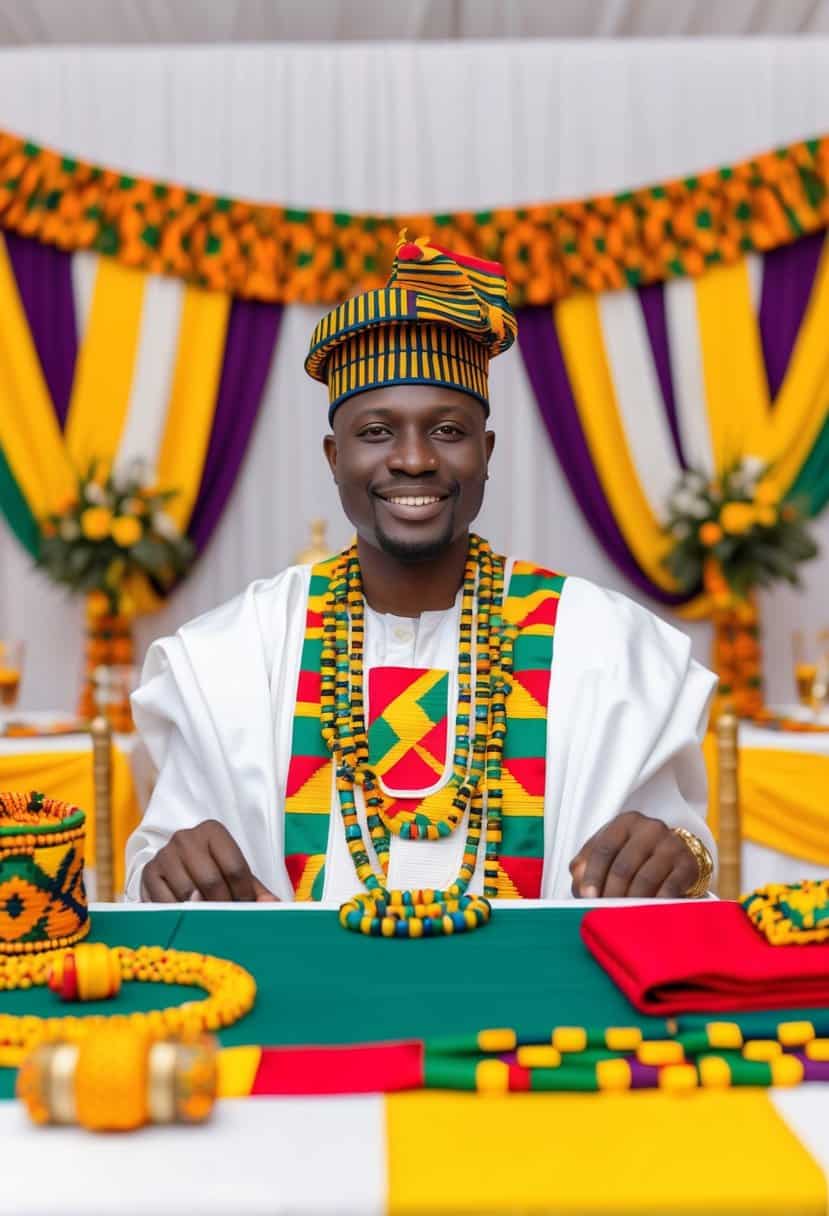
When planning a wedding in Ghana, making final preparations is crucial for a seamless event. It involves sending out invitations early, choosing reliable photography and videography services, and organizing the logistics to ensure guests are accommodated comfortably.
Handling Wedding Invitations
Deciding on your wedding guest list early helps manage expenses effectively. Begin by choosing whether to send physical or digital invitations, depending on what suits your style and budget. Digital invitations can be a cost-effective and eco-friendly choice.
Plan to send out invitations at least two to three months before the wedding date. This gives your guests ample time to prepare. Including RSVP details ensures you can finalize your guest count, which is essential for catering and venue arrangements.
Don’t forget to consider the cost of invitations in your wedding budget.
Photography and Videography
Capturing your special day is important, so hiring professional photographers and videographers is a wise investment. Research local options or ask for recommendations from friends who recently got married. Look at portfolios to ensure their style matches your vision.
Discuss your specific requirements with them, such as covering both the ceremony and reception. Think about getting both traditional and candid shots. Determine how you want your wedding day documented and clarify the package details, including edits and delivery times.
Ensure these services fit within your overall wedding budget.
Logistics and Accommodations
Arranging logistics and accommodations involves organizing transportation for you and your guests. Book reliable vehicles for your bridal party to ensure everyone arrives on time. Also, consider hiring a transportation service for guests who need help getting to the venue.
If you have out-of-town guests, reserve accommodations close to the venue. Check if the hotel offers group discounts, which can be a cost-saving measure for your guests. Clear directions and timelines for the day are important, so share these details with your guests in advance.

